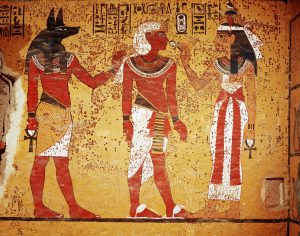In the thousands of years after the end of the last Ice Age, North Africa had a much wetter climate than it does today. Over time, the climate became drier as the wetlands turned into the Sahara Desert we know today. The land became dry and difficult for human societies to live in. In the midst of the desert, however, was a flowing river called the Nile.
The Nile supported and allowed life to thrive in the grueling climate. The earliest inhabitants along the river found that the river provided many sources of food, and more importantly, discovered an annual 6 month period where the Nile flooded. The brown layer of silt that the Nile left when it receded was full of nutrients that allowed for farming to occur. Through the use of irrigation canals, agriculture was born which paved the way for the emergence of Egyptian civilization.

This painting depicts the vitality the Nile River brings to the arid climate. Without it, Egyptian civilization could not have existed.
The inhabitants utilized the Nile to adapt to the changing environment. Instead of roaming the land, they saw the opportunity the Nile provided them through agriculture. Similar to how the Mayans developed Neolithic techniques through maize, beans, and squash in the tropical climate of Guatemalan rainforests, early Egyptians were able to grow wheat, beans, and cotton on the banks of the Nile. By determining when the Nile flooded, the river proved to be a sustainable way to live life.
The flooding of the Nile was not a perfect occurrence. This gave rise to the belief in the gods and a highly stratified social structure. At the top of the social structure were gods such as Ra and Osiris because the Egyptians believed that they controlled the universe. The Egyptians tried their best to please the gods because if they were happy, then the Nile would flood producing an abundance of crops and preventing famine. After the gods came the pharaohs in social status. The Egyptian people believed the pharaoh to be a god in mortal form. They had absolute power over the dominion which required protection through the help of government officials and soldiers. The rest of the people’s status went in the order of scribes, merchants, artisans, farmers, and finally slaves.

This wall painting depicts the King Tutankhamen with Egyptian gods Anubis and Nephthys. King Tutankhamen ruled from 1333- 1323 BCE.
This social stratification was necessary for a civilization as large as ancient Egypt to function. Slaves were utilized to build infrastructure, farmers produced the food for the society, and the other social levels contributed by either governing, defending, or producing commodities for the civilization. Social mobility was possible in ancient Egypt though. Sending sons to schools to learn how to read and write could make it possible for them to become a scribe, boosting social status.
Ancient Egyptian civilization was created and greatly influenced by the Nile River. The flooding of the Nile was sustainable but not perfectly reliable, creating the belief in gods and social stratification. The Nile River provided sustenance to Egypt for around 3000 years. In 332 BC, Alexander the Great conquered Egypt and Ptolemaic period of Macedonian rule began.
Sources:
http://www.ushistory.org/civ/3b.asp
http://www.ushistory.org/civ/3a.asp
http://www.timemaps.com/ancient-egyptian-history-3500bc
Images:
http://egyptiansyear4.weebly.com/the-uses-of-the-river-nile.html
Further Readings:
http://www.ancient.eu/article/997/
http://www.livescience.com/32616-how-were-the-egyptian-pyramids-built-.html

As population grows social stratification and job specialization occurs. With a multitude of river valley civilizations did social stratification manifest in a similar fashion? Can social class exist without the human rights violations of slavery?
As the size of any civilization increases, social stratification and job specialization will inherently have to grow in order to support the resources necessary for the people. Everyone cannot be performing the same job. Some of the population needs to specialize in agriculture, some in government leadership, and others in maintenance. Everyone needs to have a specific niche in order to run civilizations at such a grand scale. Take for example the Chinese Terracotta Army and the Pyramids in Egypt. If everyone worked on the building of the structures, then no one would be able to produce food and lead the civilizations. This is where social stratification occurs as the more favorable jobs (high leadership positions) are given to people who are higher up on the social ladder.
In theory, explicit social class can exist without slavery, however it will never actually happen as the benefits that slavery provides to a civilization are enormous. For example, slaves and indentured servants were a major asset to the construction of the Egyptian pyramids.